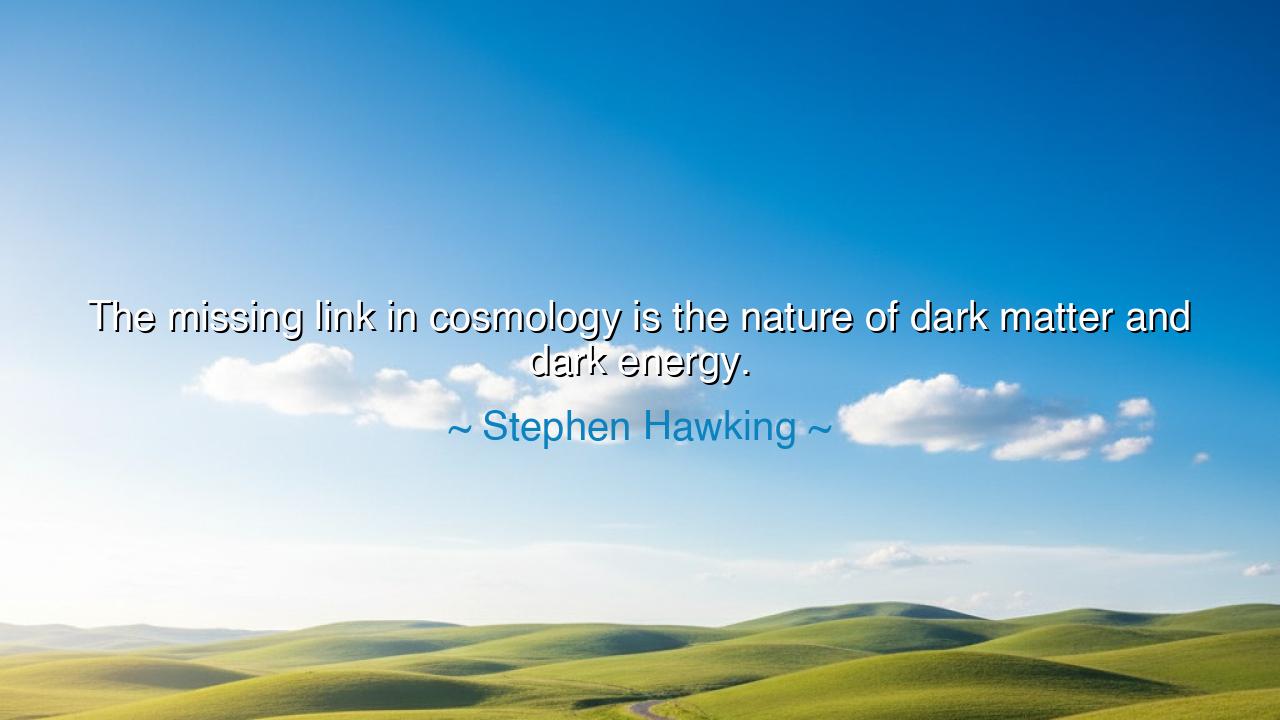
The missing link in cosmology is the nature of dark matter and






Hear the voice of Stephen Hawking, seer of the stars and interpreter of the void, who declared: “The missing link in cosmology is the nature of dark matter and dark energy.” These words are both confession and prophecy. For even as humanity’s intellect has climbed the heavens, measuring galaxies and charting time itself, a vast mystery remains: that most of the universe is hidden, unseen, unmeasured, a shadow whose nature eludes us.
The ancients looked up at the night sky and believed the stars to be gods, their motions the writing of destiny. They did not yet know of galaxies, nor of gravity, nor of the forces that bind the cosmos. Yet they were right to sense that the heavens contain secrets beyond mortal reach. Hawking, inheritor of their wonder, names these secrets not as myth, but as science: dark matter, unseen yet giving weight to galaxies, and dark energy, the hidden breath that drives the expansion of the universe. What the ancients cloaked in divinity, we now cloak in mathematics. And still, mystery abides.
The meaning is this: even at the height of knowledge, there are missing links, gaps that humble us. For though we have mapped atoms and split them, though we have walked upon the Moon and listened to the echoes of the Big Bang, we understand only a fraction of reality. More than ninety percent of the cosmos lies hidden in darkness, silent yet powerful, shaping all things. Hawking’s words remind us that humility is the crown of true knowledge. To seek truth is not to master all, but to confess the vastness of what is unknown.
Consider the story of Isaac Newton, who revealed the laws of motion and the pull of gravity. To his peers, it seemed he had unveiled the very workings of God’s universe. Yet Newton himself declared, “I am but a boy playing on the seashore, while the great ocean of truth lies undiscovered before me.” So it is with Hawking: though he explained black holes and pondered the beginning of time, he pointed to the ocean yet uncharted—dark matter and dark energy, the currents beneath creation itself.
And yet, there is courage in this humility. For the unknown is not a wall but a summons. Just as sailors once crossed uncharted seas to discover new lands, so too scientists now cross the unknown void, guided by equations rather than stars, seeking to uncover what lies behind the veil of darkness. The search for these mysteries is not mere curiosity, but the very act of humanity reaching beyond itself, refusing to remain bound by ignorance.
The lesson is for all, not only for scholars of the cosmos. In every life there are missing links—truths we cannot yet see, forces we cannot yet name, mysteries within our own hearts. Do not despair of them, nor turn away. Like Hawking, acknowledge them with honesty, and let them drive you forward. For the unknown is not an enemy, but a teacher; it is the shadow that makes the light more radiant, the silence that makes wisdom more precious.
Practical action is clear: cultivate wonder. Do not be content with what you know. Read of the stars, of the oceans, of the mysteries within your own body and mind. Embrace uncertainty as the path to growth. And when you meet a missing link in your journey—whether in your work, your relationships, or your spirit—do not fear it. Let it humble you, let it challenge you, let it inspire you to press deeper into truth.
So let Hawking’s words endure: “The missing link in cosmology is the nature of dark matter and dark energy.” They remind us that the universe is not finished, nor is our understanding. And as long as we stand beneath the stars, gazing upward with wonder and courage, we, too, are part of that grand search for the hidden realities of existence.






AAdministratorAdministrator
Welcome, honored guests. Please leave a comment, we will respond soon